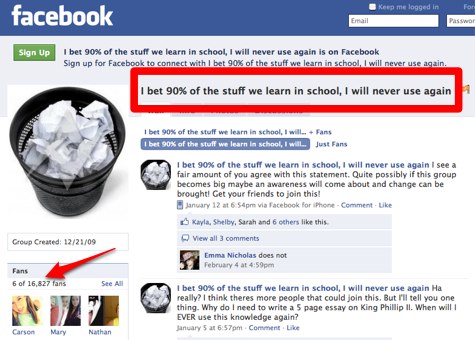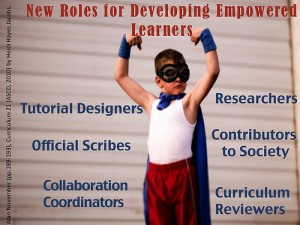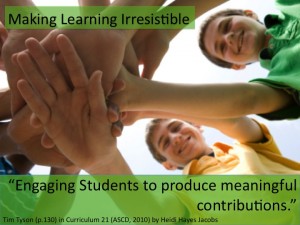Students as Meaningful Contributors by Silvia Rosenthal Tolisano

Tools and ideas to transform education. Sign up below.
You are now subscribed
Your newsletter sign-up was successful
Cross posted to Langwitches Blog
Alan November talks about the importance of making students contributors to their own learning. I have been following his work for years (seen him present in person a couple of times too). I have been especially paying attention to his thoughts about how, over the years, it seems that we have taken away the reason/relevance for learning of our children.
Years ago, when farms dominated our landscape, children were responsible for performing meaningful jobs that were vital to each family’s success. [...] Children were essential to the very survival of the family. At the same time, these jobs taught children the value of hard work, leading them to become more productive citizens within their communities as adults. As mechanized tools and other advances developed, the work of children was replaced. To prepare for the industrial economy, students were required to attend school where teachers became central figures and where children took on more passive roles within their communities. The contributions made by children to their community shifted to the responsibility of completing schoolwork
How often have we heard the moaning from our students and/or own children?
Why do I have to learn this? I will never use it again.
There is even (why would I be surprised?) a facebook group called "I bet 90% if the Stuff we learn in School, I will never use again" It has over 16,000 members...

Maybe we need to start listening to our children. They don't see the relevance of what they are learning in school. They don't see how they will apply in real life what they are being asked to learn. So how do we give students back their purpose? Alan November suggests six different roles for developing empowered learners.
Tools and ideas to transform education. Sign up below.

Visual adapted from Alan November (pp.188-193), Curriculum 21 (ASCD, 2010) by Heidi Hayes Jacobs Here are examples of
- Tutorial DesignersMiddle School Math WikiMath Music VideosSmartBoard- Students becoming the Teacher
- Official ScribesBackchanneling with Elementary School StudentsDocumenting Skype Connections via Backchannel & Data Collection for Around the World with 80 Schools
- Collaboration Coordinators
- ResearchesSlavery Museum for Teens Wiki
- Contributors to SocietyKids for KenyaHow Three Cups of Tea Changed my LifeKids are Heroes
- Curriculum Reviewers
I must admit, that I have not ventured into working with my students (K-8) to being the "Collaboration Coordinators" and "Curriculum Reviewers". I would love to read and hear about other teachers who have and are willing to share their experiences. Please help me collect and add more examples to these by leaving a link and short description in the comment section! You can read Alan November describe his thoughts about Students as Contributors: The Digital Learning Farm or in Chapter "Power Down or Power Up?" in Hayes Jacobs' book Curriculum 21 (ASCD, 2010). In a video, Alan describes the critical need for kids to make a contribution:
Going back to the days of this town [Marblehead, MA]...you were 10 years old, you went to sea and you were an apprentice, you were working, you did not go to Middle School or High School in this town in the 1700s [...] What we did, I believe, over time...and the irony is that technology did this...because we invented all these kinds of machinery, we don't need kids working anymore. So we robbed them of their sense of making a contribution to community. I think one of the breakthrough ideas is to change the concept of the learner into someone who becomes a contributor by doing their work. Which means we have to redefine their work.
Another person who not only talks about the importance of making students contributors, but who has walked the walk is Tim Tyson.

Visual adapted from Tim Tyson (p. 130), Curriculum 21 (ASCD, 2010) by Heidi Hayes Jacobs. The now retired principal of Mabry Middle School (archived site) describes how his school is" Making learning irresistible". He describes how he extended that vision into the classroom in Heidi Hayes Jacobs's book "Curriculum 21". His school's
explorations in engaging students to produce meaningful contributions were just fine, tentative steps in moving school practice in a completely new direction. Imagine extending these first awkward steps, infusing them more deeply into instructional practices [...] Would schools proffer a better learning experience if they empowered students themselves, under the professional and informed coaching of their teachers, to actively create high-quality, media rich, digital curricular contributions that are aggregated and shared with learners of all ages, the world over?
